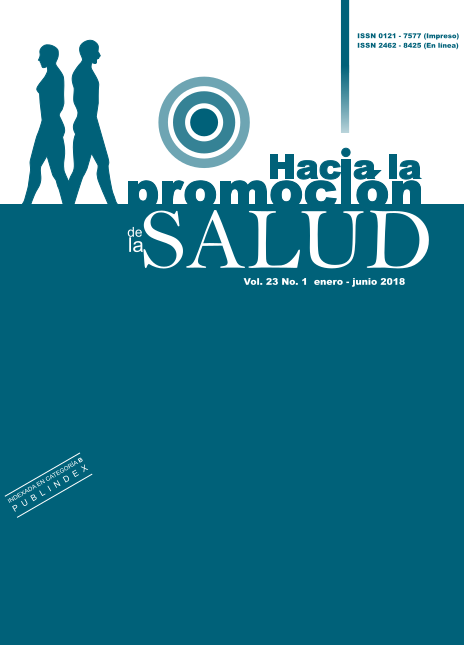Autores
Resumo
Objetivo: Caracterizar os conhecimentos, as atitudes e as práticas de profissionais da saúde que reflitam estigma e discriminação frente à tuberculose (TB) em municípios prioritários do Litoral Pacífico colombiano. Materiais e Métodos: Realizou se um estudo qualitativo descritivo com 13 profissionais da saúde, vinculados aos programas de TB de 4 municípios prioritários no Litoral Pacífico nariñense “Nariño cidade da Colômbia”. Realisou se entrevistas em profundidade e grupos focais. Resultados: Os profissionais da saúde têm adequados conhecimentos sobre a doença e o tratamento, mas suas crenças sobre as causas da doença e algumas atitudes frente às pessoas com TB reflitam estigma. Suas práticas foram pouco discriminatórias para os pacientes e suas famílias, incluso tem práticas de risco para sua saúde como não usar as medidas de biossegurança para evitar fazer sentir discriminados os pacientes. A maioria dos profissionais reportou ser discriminada por seu labor, a qual implica um contato diário e um alto risco de infecção, provindo estas atitudes por parte de seus familiares e de outros profissionais do sector saúde. Conclusões: Os resultados de este estudo apontam focos importantes de atenção nas ações de prevenção do estigma e a discriminação frente ás pessoas com TB, que não tem sido visibilizados por estudos quantitativos no país.
Palavras-chave
Referências
2. WHO. Global tuberculosis report 2016. Geneva: World Health Organization; 2016.
3. Country Coordination Mechanism - CCM Colombia. Strengthen the STOP the TB strategy in 46 priority municipalities from Colombia. Proposal form - round 10 single country applicant. Colombia: 2010.
4. Coreli J, Lauzardo M, Heurtelou M. Anticipated tuberculosis Stigma among Health Professionals and Haitian Patients in South Florida. NIH Public Access. 2012; 23 (3): 636-50.
5. Akin S, Gorak G, Unsar S, Mollaoglu M, Ozdilli K, Durna Z. Knowledge of and attitudes toward tuberculosis of Turkish nursing and midwifery students. Nurse Education Today. 2011; 31: 774-9.
6. Thu A, Ohnmar Win H, Nyunt MT, Lwin T. Knowledge, attitudes and practice concerning tuberculosis in a growing industrialized area in Myanmar. IJTLD. 2012; 16 (3): 330-5.
7. Moya EM. Tuberculosis and stigma: Impacts on health-seeking behaviors and access in Ciudad Juarez, Mexico, and El Paso, Texas. El Paso: University of Texas; 2010.
8. Carvajal-Barona R, Varela-Arévalo MT, Hoyos PA, Angulo-Valencia ES, Duarte-Alarcón C. Conocimientos, actitudes y prácticas frente a la tuberculosis en trabajadores del sector salud en municipios prioritarios de la Costa Pacífica colombiana. Rev. Cienc. Salud. 2014; 12 (3): 339-352.
9. Dodor E, Kelly S, Neala K. Health professionals as stigmatizes of tuberculosis: Insights from community members and patients with TB in an urban district in Ghana. Psychology, Health & Medicine. 2009; 14 (3): 301-10.
10. Goffman E. Estigma. La identidad deteriorada. Buenos Aires: Editorial Amorrortu; 1963.
11. Abouchaar G. Factores asociados al estigma en pacientes en tratamiento de tuberculosis en la Red Pública de Santiago de Cali 2002. [Tesis de Maestría en Epidemiología]. Cali: Universidad del Valle; 2002.
12. Kiefer E, Shao T, Carasquillo O, Nabeta P, Seas C. Knowledge and attitudes of tuberculosis management in San Juan de Lurigancho district of Lima, Perú. J Infect Dev Ctries. 2009; 3 (10): 783-8.
13. Carvajal R. Conocimientos, actitudes y prácticas relacionadas con la tuberculosis en profesionales de la salud del Valle del Cauca, Colombia 2010. Informe Final de Investigación. Cali: Secretaria de Salud Departamental del Valle del Cauca; 2011.
14. Dodor E, Neal K, Kelly S. An exploration of the causes of tuberculosis stigma in an urban district in Ghana. IJTLD. 2008; 12 (9): 1048-54.
15. Dodor E, Kelly S. Manifestations of tuberculosis stigma within the healthcare system: The case of Sekondi-Takoradi Metropolitan district in Ghana. Health Policy. 2010; 98: 195-202.
16. Organización Panamericana de la Salud. Recomendaciones sobre la ética de la prevención, atención y control de la tuberculosis. Disponible en: http://www.paho.org/hq/index.php?option=com_docman&task=doc_view&gid=22763&Itemid=270.
17. World Health Organization. Ethics guidance for the implementation of the End TB strategy. Disponible en: http://apps.who.int/iris/bitstream/10665/254820/1/9789241512114-eng.pdf?ua=1.
18. Law M, Stewart D, Lette I, Pollock N, Bosch J, Westmorland M. Instrucciones para el formulario de revisión crítica estudios cualitativos. Disponible en: https://srs-mcmaster.ca/wp-content/uploads/2015/04/Guidelines-for-Critical-Review-Form-Quantitative-Studies-Spanish.pdf.
19. Hernández R, Fernández C, Baptista P. Metodología de la investigación. Ciudad de México: McGraw-Hill; 2006.
20. Noreña A, Alcaraz N, Rojas J, Rebolledo D. Aplicabilidad de los criterios de rigor y éticos en la investigación cualitativa. Aquichan. 2012; 2 (3): 263-74.
21. Ministerio de Salud de Colombia. Resolución 008430 de 1993, por la cual se establecen las normas científicas, técnicas y administrativas para la investigación en salud. Bogotá: El Ministerio; 1993.
22. Miric M. Escala para la evaluación del estigma sentido entre las personas VIH positivas en la república dominicana. Paradigmas. 2004; 4: 70-101.


 PDF (Español)
PDF (Español)
 FLIP
FLIP



























